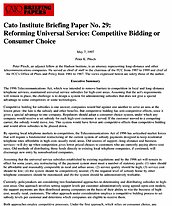Competitive bidding for subsidies is one answer; companies would bid against one another to serve an area at the lowest price–the lure is the subsidy and other benefits. But competitive bidding has anti-competitive effects, since it gives a special advantage to one company. Regulators should adopt a consumer choice system, under which any company would receive a set subsidy for each high-cost customer it served. If the customer moved to a competing carrier, the subsidy would move, too. This system would have fewer anti-competitive effects than competitive bidding and would allow subsidies to be phased down.
Reforming Universal Service: Competitive Bidding or Consumer Choice
The 1996 Telecommunications Act, which was intended to remove barriers to competition in local and long-distance telephone services, maintained universal service subsidies for high-cost areas. Assuming that the act’s requirements will remain in place, the challenge is to design a system for administering subsidies that does not give a special advantage to some competitors or some technologies.
About the Author
Peter Pitsch, an adjunct fellow at the Hudson Institute, is an attorney representing long-distance and other telecommunications companies. He served as chief of staff to the chairman of the FCC from 1987 to 1989 and chief of the FCC’s Office of Plans and Policy from 1981 to 1987. The views expressed herein are solely those of the author.

This work is licensed under a Creative Commons Attribution-NonCommercial-ShareAlike 4.0 International License.
